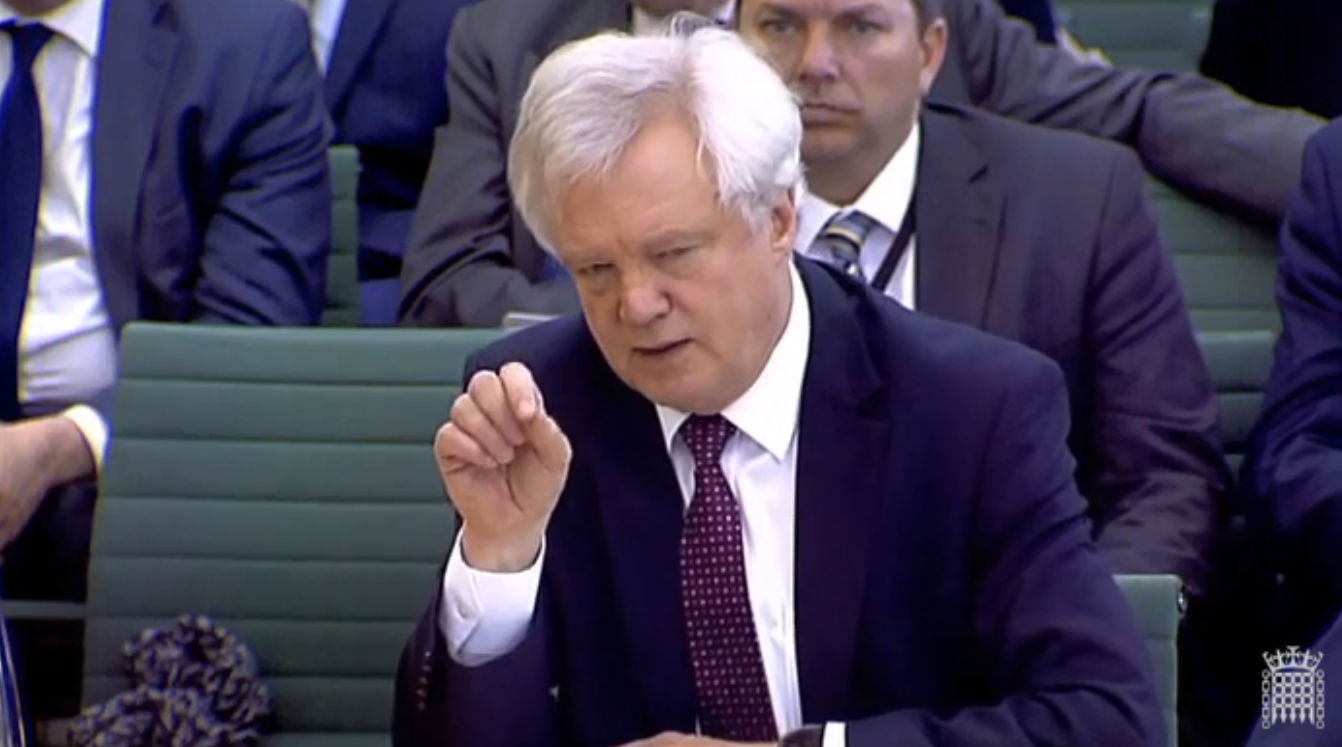
It is highly likely that Britain will strike a Brexit deal with the European Union, according to David Davis, who is leading the UK’s negotiations with Brussels.
Davis, who was quizzed on the progress of Brexit negotiations by a committee today, also confirmed the UK will leave the EU customs union, even if MPs vote against the idea.
His defiant testimony comes the day before the House of Commons is set to vote on an amendment of the EU Withdrawal Bill.
The amendment, proposed by the House of Lords, would require the government to try to stay in the customs union, and may be supported by some Tory rebels.
Here is a round-up of what we learnt from Davis’ testimony to the Commons committee on Exiting the EU on the progress of Brexit negotiations.
What was the mood?
The mood was quite awkward, as Davis announced at the beginning of the meeting that he only had “90 minutes before another important meeting” raising a few eyebrows in the committee panel.
How well do you really know your competitors?
Access the most comprehensive Company Profiles on the market, powered by GlobalData. Save hours of research. Gain competitive edge.

Thank you!
Your download email will arrive shortly
Not ready to buy yet? Download a free sample
We are confident about the unique quality of our Company Profiles. However, we want you to make the most beneficial decision for your business, so we offer a free sample that you can download by submitting the below form
By GlobalDataThe grilling comes ahead of a meeting today of a cabinet sub-committee dubbed the Brexit war cabinet which will bring together senior ministers to come up with new solutions before the June European Council meeting.
Nobody wants it to go down the route of “no deal”
It’s “unlikely” that Britain and EU will end up with no Brexit deal, David Davis told the Committee.
The complete absence of any outcome [of negotiations] is unlikely.
You might end up with a bare-bones deal, or a series of bi-lateral deals. I think the massively higher probability is for a deal.
He said that nobody wants it to go down the route of “no deal”.
Asked by Labour MP Pat McFadden what the government would do if the UK House of Commons voted down the resolution approving the Brexit deal, Davis said that the 27 EU member states would have to give their approval before the Article 50 process could be extended.
Asked what would happen if Britain crashed out of the EU with no deal he answered:
If there is an absolute no deal there will be a tariff arrangement in place.
He added that existing EU laws will stay the same if the Brexit bill doesn’t make it through parliament.
MPs telling the government to renegotiate the final deal would be like the UK returning to Brussels “with its tail between its legs”, Davis said.
The government is set to ignore MPs on the customs union
Defending the government’s policy to leave the EU customs union, Davis hinted that UK negotiators would go ahead with exiting the union even if the House of Commons voted against it tomorrow.
Asked how the UK government would react to defeat on a post-Brexit customs union, Davis said:
“The government respects parliament, but if the government is defeated in these arguments, I expect their policy to be upheld, for good reason.
Asked why he is dead set on leaving the customs union, Davis said because it would give the UK the freedom to pursue game-changing opportunities outside the union.
The [Brexit] commission itself has said that 90% of growth in world trade would come from outside the union.
He told the Select Committee that 60% of trade is currently with the EU, while 40% is outside, but after Brexit this will be reversed.
You mustn’t throw away 40%, you must do something to defend that. But the 60% is where we have huge opportunities.
Parliament to vote on the final Brexit deal
Davis restated the government’s promise that parliament will get a “meaningful vote” on the final deal.
He said that rather than being presented with “a draft treaty”, parliament would likely be presented with “a political declaration”.
Such a treaty would be amendable, he said. Other treaties arising from the Brexit process on issues such as security, defence and a main agreement on economic relations could also be put to a parliamentary vote.
Irish border question
The UK will avoid a hard Irish border “at all costs”, according to Davis, by installing cutting-edge border technology and by securing a “good free trade” agreement with the EU.
We will come up with a mechanism that will enable that to happen.
The best way to do that is with a good free-trade agreement, because that eliminates a lot of the issues.
Staying in the EU customs union would prevent a hard border with Ireland but would stop the UK from forging trade deals elsewhere in the world.
Brussels has reportedly dismissed both of London’s suggestions for the UK to collect customs tariffs on behalf of the EU as part of a free-trade agreement and to use technology to ensure frictionless transit at the border.
Davis brushed off claims that Brussels had vetoed the UK’s initiatives, and said the UK Government had already started talks with prospective suppliers of high-tech border technology.
He said there were three options on the table, and a free trade agreement is what the government wants.
What about immigration?
Davis said the UK’s post-Brexit immigration policy and arrangements cannot be figured out until the Migration Advisory Council’s report on the issue is published in September.







